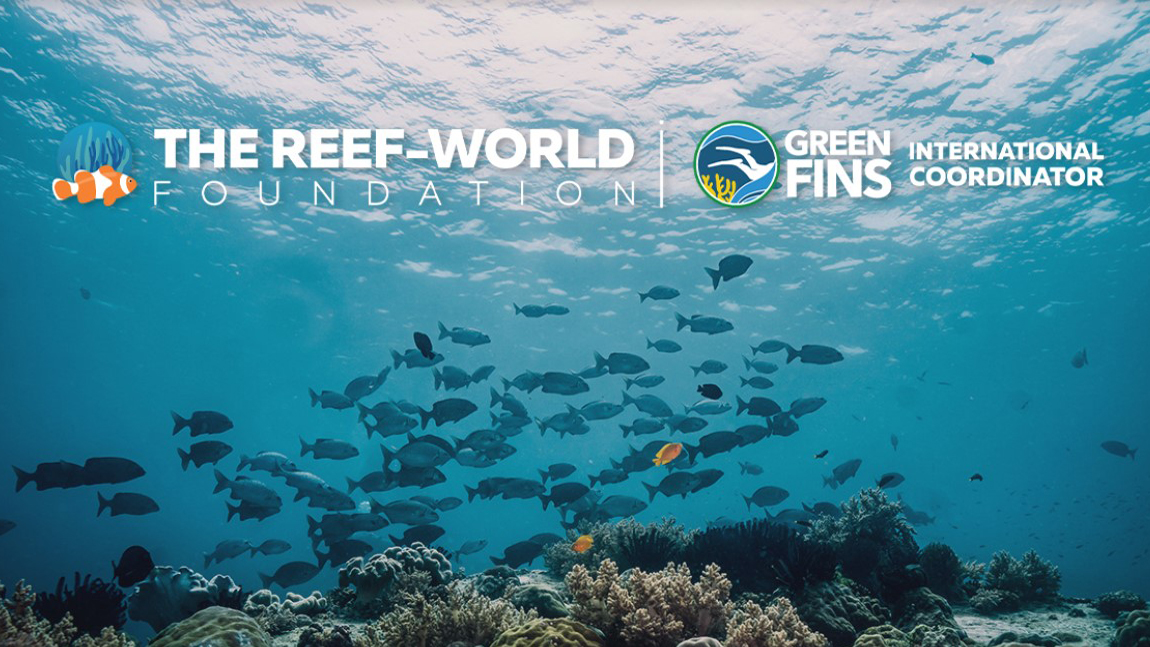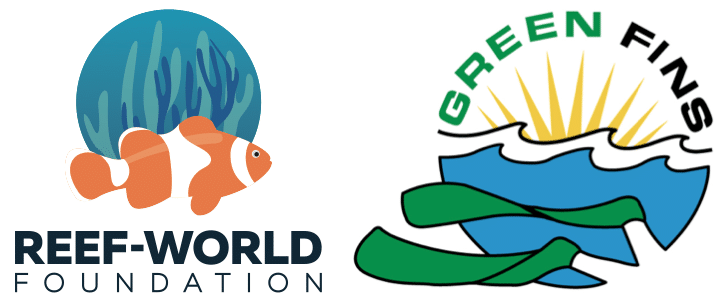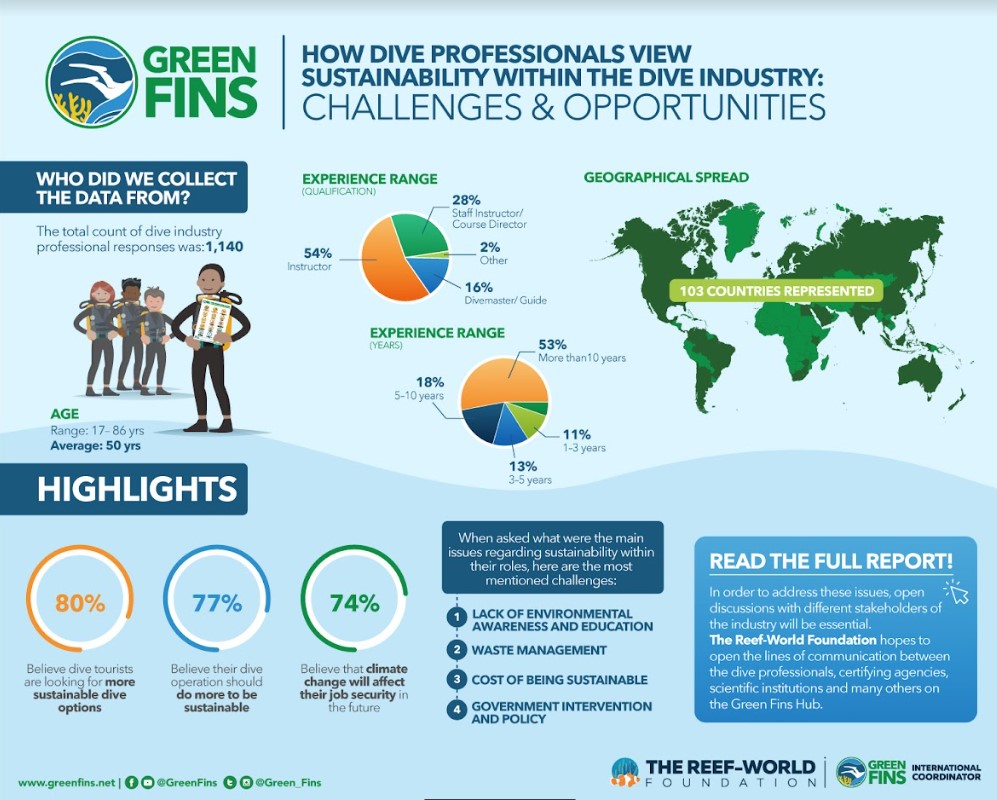Marine Life & Conservation
Reef-World Releases New Sustainability Study

 The Reef-World Foundation released a new report summarising the results from an online survey conducted from April to June 2022, which received over 2,400 responses from various demographics. The study reveals new travel trends and how important sustainability is regarded in this new era of tourism as the industry recovers from the COVID-19 pandemic. Reef-World hopes for the report to assist in this rehabilitation process and aid marine tourism businesses, local governments and communities to not only bounce back better but also prepare themselves for a bright future of travel, all whilst protecting the ocean.
The Reef-World Foundation released a new report summarising the results from an online survey conducted from April to June 2022, which received over 2,400 responses from various demographics. The study reveals new travel trends and how important sustainability is regarded in this new era of tourism as the industry recovers from the COVID-19 pandemic. Reef-World hopes for the report to assist in this rehabilitation process and aid marine tourism businesses, local governments and communities to not only bounce back better but also prepare themselves for a bright future of travel, all whilst protecting the ocean.
“This survey has highlighted some really encouraging trends,” said Chloe Harvey, Director at The Reef-World Foundation. “The Gen Z and Millennials, those with the biggest buying power today and tomorrow, are seeking out experiences that align with their sustainability values. They are willing to pay more for sustainable offerings and are wanting to educate themselves and be involved in meaningful environmental activities while on holiday. This is so positive for both the industry and the environment upon which it is built. It’s given us a sneak peek into the future of marine tourism; one where sustainability is no longer a competitive edge, but a minimum requirement. We’re proud that the Green Fins approach and tools remain at the cutting edge, delivering on the needs of the industry and the consumer as we move into this new era of tourism.”
The report has identified some of the key narratives that will drive the market in the future and insights to help businesses take advantage of these trends for the future sustainability of their business and the environment it is built on. One main highlight from the report is that the demands from dive tourists have shifted since the pandemic.
Emerging from a travel hiatus, they now want more sustainable holiday options and more transparency around options coined as environmentally friendly during their dive trips. While 75% of dive tourists are willing to pay more for sustainability, they fear spending more on their holidays due to the risk of contributing money towards “greenwashing”. The tourism industry needs a brand-conscious, transparent, and effective global green label to address that.
The industry professionals (guides, instructors, business owners) have also spoken. The data clearly suggests they seek more environmental education and tools to raise environmental awareness, both for themselves and their customers. From their perspective, the fact that these are lacking represents the single biggest challenge for them on achieving their sustainability goals in their workplace. An overwhelming majority of dive professionals think dive operators, including the operations they work in, should do more to protect the environment. Dive tourists are also calling on marine tourism operators to do better. They believe these businesses profit from tourism and therefore have a responsibility to protect the environment and surrounding ecosystems they work in and should be held accountable for their actions.
The Reef-World Foundation leads the global implementation of the UN Environment Programme’s Green Fins initiative, which focuses on driving environmentally friendly scuba diving and snorkelling practices across the industry globally. Green Fins offers the world’s first independent certificate to stop the environmental impact from marine-based tourism. It is a proven conservation management approach that leads to a measurable reduction in the negative environmental impacts of marine tourism.
The survey, conducted with the support of Reef-World’s partners, PADI, RAID, PSS and ZuBlu, proves that tourists will be increasingly voting with their wallets and selecting businesses and brands that align with their values for sustainability and preservation of our incredible ocean ecosystems.
To learn how the key findings from the survey can help marine tourism businesses to bounce back from the pandemic while keeping sustainability at the forefront, download the full report.
Blogs
Invitation from The Ocean Cleanup for San Francisco port call

6 years ago, The Ocean Cleanup set sail for the Great Pacific Garbage Patch with one goal: to develop the technology to be able to relegate the patch to the history books. On 6 September 2024, The Ocean Cleanup fleet returns to San Francisco bringing with it System 03 to announce the next phase of the cleanup of the Great Pacific Garbage Patch and to offer you a chance to view our cleanup system up-close and personal.
We look forward to seeing you there.
To confirm your presence, please RSVP to press@theoceancleanup.com
PROGRAM
Join The Ocean Cleanup as our two iconic ships and the extraction System 03 return to San Francisco, 6 years and over 100 extractions after we set sail, to create and validate the technology needed to rid the oceans of plastic.
Our founder and CEO, Boyan Slat, will announce the next steps for the cleanup of the Great Pacific Garbage Patch. Giving you a chance to view our cleanup system and the plastic extracted.
Hear important news on what’s next in the mission of The Ocean Cleanup as it seeks to make its mission of ridding the world’s oceans of plastic an achievable and realistic goal.
Interviews and vessel tours are available on request.
PRACTICALITIES
Date: September 6, 2024
Press conference: 12 pm (noon)
Location: The Exploratorium (Google Maps)
Pier 15 (Embarcadero at Green Street), San Francisco, CA
Parking: Visit The Exploratorium’s website for details.
RSVP: press@theoceancleanup.com
Video & photo material from several viewing spots around the bay
We look forward to seeing you there!
ABOUT THE OCEAN CLEANUP
The Ocean Cleanup is an international non-profit that develops and scales technologies to rid the world’s oceans of plastic. They aim to achieve this goal through a dual strategy: intercepting in rivers to stop the flow and cleaning up what has already accumulated in the ocean. For the latter, The Ocean Cleanup develops and deploys large-scale systems to efficiently concentrate the plastic for periodic removal. This plastic is tracked and traced to certify claims of origin when recycling it into new products. To curb the tide via rivers, The Ocean Cleanup has developed Interceptor™ Solutions to halt and extract riverine plastic before it reaches the ocean. As of June 2024, the non-profit has collected over 12 million kilograms (26.4 million pounds) of plastic from aquatic ecosystems around the world. Founded in 2013 by Boyan Slat, The Ocean Cleanup now employs a broadly multi-disciplined team of approximately 140. The foundation is headquartered in Rotterdam, the Netherlands, and opened its first regional office in Kuala Lumpur, Malaysia, in 2023.
Find out more about The Ocean Cleanup at www.theoceancleanup.com.
Marine Life & Conservation
SHARK MONTH ARRIVES AT ROYAL WILLIAM YARD, PLYMOUTH

A shark has been spotted approaching Royal William Yard in Plymouth, much to the surprise of swimmers, paddleboarders and onlookers.
With its distinctive dorsal fin cutting through the water, the sizeable shark swam along the coastline, before turning to head inland towards Firestone Arch at Royal William Yard. The appearance drew a crowd, who were captivated for more than an hour by the unusual sight – and it was all caught on video.
The shark is one of many expected sightings at Royal William Yard over the coming weeks… because today marks the start of Shark Month!
In reality, the ‘shark’ spotted along the Plymouth shoreline was actually a custom-made model, created by the team at Royal William Yard and sailed underwater by Caroline Robertson‑Brown from the Shark Trust, who donned scuba diving gear for the occasion.
The stunt took place to launch Shark Month in style and draw attention to the work of the leading international conservation charity, which is based in Britain’s Ocean City. Spectators were reassured that the water was safe and many entered into the spirit of the performance, swimming or sailing alongside the shark.
Shark Month will take place across Royal William Yard throughout July and will feature an extravaganza of art, entertainment and advocacy for everyone to enjoy. The packed programme of events starts with an art exhibition and ends with a trip on paddleboards with shark experts – with everything from a shark quiz to a Jaws screening in between.
Paul Cox, CEO of the Shark Trust, said: “There are often assumptions and misconceptions when it comes to sharks. This was certainly the case with the shark spotted at Royal William Yard! While the British coastline is home to many species of shark, this was not one of them. However, we’re thrilled it caught people’s attention, because seeing a shark is a special and memorable moment. That is precisely why we want to celebrate these incredible creatures, highlight the need for conservation, and ask for help to safeguard their future.”
For more information about Shark Month at Royal William Yard, visit the Shark Trust Website.
Images and video: Jay Stone
-

 Blogs2 months ago
Blogs2 months agoDiving With… Nico, Ocean Earth Travels, Indonesia
-

 News1 month ago
News1 month agoMurex Bangka Announce New Oceanfront Cottages & Beachfront Dining
-

 Blogs2 months ago
Blogs2 months agoA new idea in freediving from RAID
-

 Marine Life & Conservation1 month ago
Marine Life & Conservation1 month agoIceland issue millionaire whale hunter a licence to murder 128 vulnerable fin whales
-

 Marine Life & Conservation2 months ago
Marine Life & Conservation2 months agoThe Shark Trust Great Shark Snapshot is back
-

 News3 months ago
News3 months agoCharting New Waters; NovoScuba Goes Global with the Launch of their Revolutionary Dive Training Agency!
-

 Gear News1 month ago
Gear News1 month agoNew Suunto Ocean – a dive computer and GPS sports watch in one for adventures below and above the surface
-

 Marine Life & Conservation Blogs2 months ago
Marine Life & Conservation Blogs2 months agoBook Review: Plankton

















